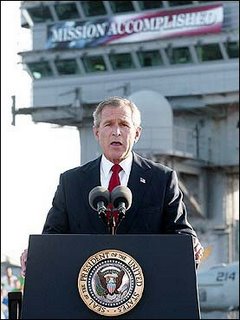Three Years Later...Mission Unaccomplished

It was three years ago today when President Bush thought it would be "cool" to land a plane on an aircraft carrier and announce the end of combat operations in Iraq and the success of US and coalition forces.
Today, three years after that infamous stunt, Iraq is as unstable as one could imagine.
Three years later, thousands of Iraqis are fleeing their homes in neighborhoods ravaged by sectarian violence.
Three years later, members of the new Iraqi security forces ripped off their military uniforms protesting a plan that would force them to serve outside of their province.
Three years later, more and more Americans are doubting the success or possibility of success in Iraq. A CNN poll shows that 44% of Americans believe the US will never accomplish its goals in Iraq, 40% believe the US will accomplish its goals in Iraq someday, and only 9% believe US goals in Iraq have already been accomplished.
Three years later, "the troop training program that the United States began in 2003 to protect Iraq's oil and electrical lines" has proven to be a failure, according to an inspector general report.
Three years later, "a US Congressional inspection team set up to monitor reconstruction in Iraq has published a scathing report on failures by contractors to carry out projects worth hundreds of millions of dollars. In one case, the inspectors found that three years after the invasion only 6 of 150 health centres proposed for Iraq have been completed by a US contractor, in spite of 75 per cent of the $US186 million allocated having been spent."
Mr. Bush & Mr. Rumsfeld, I hope you feel accomplished.
[technorati tags: news, Iraq, war, Bush, democracy, failure, oil, violence]
Labels: human rights, Iraq









4 Comments:
There is a difference between ousting a dictator and occupying a country (with no end in sight). Not many rational people claim that Saddam is a good man, but to justify his removal with a US-led occupation that has led to innumberable problems is unethical. Whether people are killed in a grave or as a result of a civil war should be moot. People are suffering just as much (if not more) today as than in Saddam's day. So, anytime anyone tells me that life under Saddam was horrible, I have to ask: is the alternative better? I guess, for now, only time will tell.
The other problem is the Arab leadership. If these leaders do not face the real issues of the region (Palestinian conflict, socio-economic status of the people, the religious role in gov't, etc.), they will always be pawns of the West and, consequently, the people will never control their own destinies. It's just a shame that most leaders of the region are too worried about their own status or wealth than the welfare of the people.
Tommy, I had numerous Iraqi friends who very much WANTED American to step in all those years ago, and who had high hopes and staggerring optimism. They, together with myself and countless Arabs around the world, cheered and clapped when Saddam was caught like a rat in a hole. Like anyone would react when a murdering piece of scum is finally caught.
But now, these same Iraqis, alongside myself, are ruing the day. This is constant death, with negative affects rippling out of the stone and across the region from its every side, like a rock dropped into a pool of water. It's horrific, with no end in sight, and nothing can justify it. Death has become the norm in a ravaged country that was once housed the cultural riches of ages gone by.
Back then you had to worry about being thrown into a mass grace, you say. What's the difference now? I see mass graves all over the place.
Sorry, very badly written up there, but I was getting a bit emotional! I'm just saying, Moi your post is important in what it is highlighting, and what it is not denying. And Tommy, you are twisting it around completely. Death, in whatever form, is not to be taken lightly at all. How can this death be better than the death of years gone by? Makes no sense.
Akram , welcome!
Needless to say, I completely agree with you and Hala, and the problem of Arab leadership usually goes unnoticed, unfortunately.
Tommy, the ends don't justify the means. I never said that I would like to see Saddam remain in power. In fact, even before the war, I always believed that he was the #1 cause of the Iraqi people's suffering. The sanctions were imposed because of his belligerence, but his people paid the price.
The goal of removing a ruthless dictator does not justify the means by which it was done: an unplanned post-war period. The US and coalition troops have a responsibility to maintain peace after the fall of the old regime. Unfortunately, they did not heed the warnings of military experts or politicians and continued to act in their typical careless manner. Not to mention that they flagrantly lied about the reason why they were taking us to war.
My best friend is Iraqi and I have been experiencing the suffering that she has been going through since the start of the war...losing family members because of the current instability. She didn't lose any during the actual war, but in the months after the war, after Bush had proclaimed that we had won. It is the responsibility of the occupier to maintain peace and security, of the Iraqi people that is, not the oil ministry.
Don't take me back to the Saddam era because we are living in an Iraq that the Bush administration continues to proclaim is much better than it used to be. Unfortunately, that is a lie.
Post a Comment
<< Home